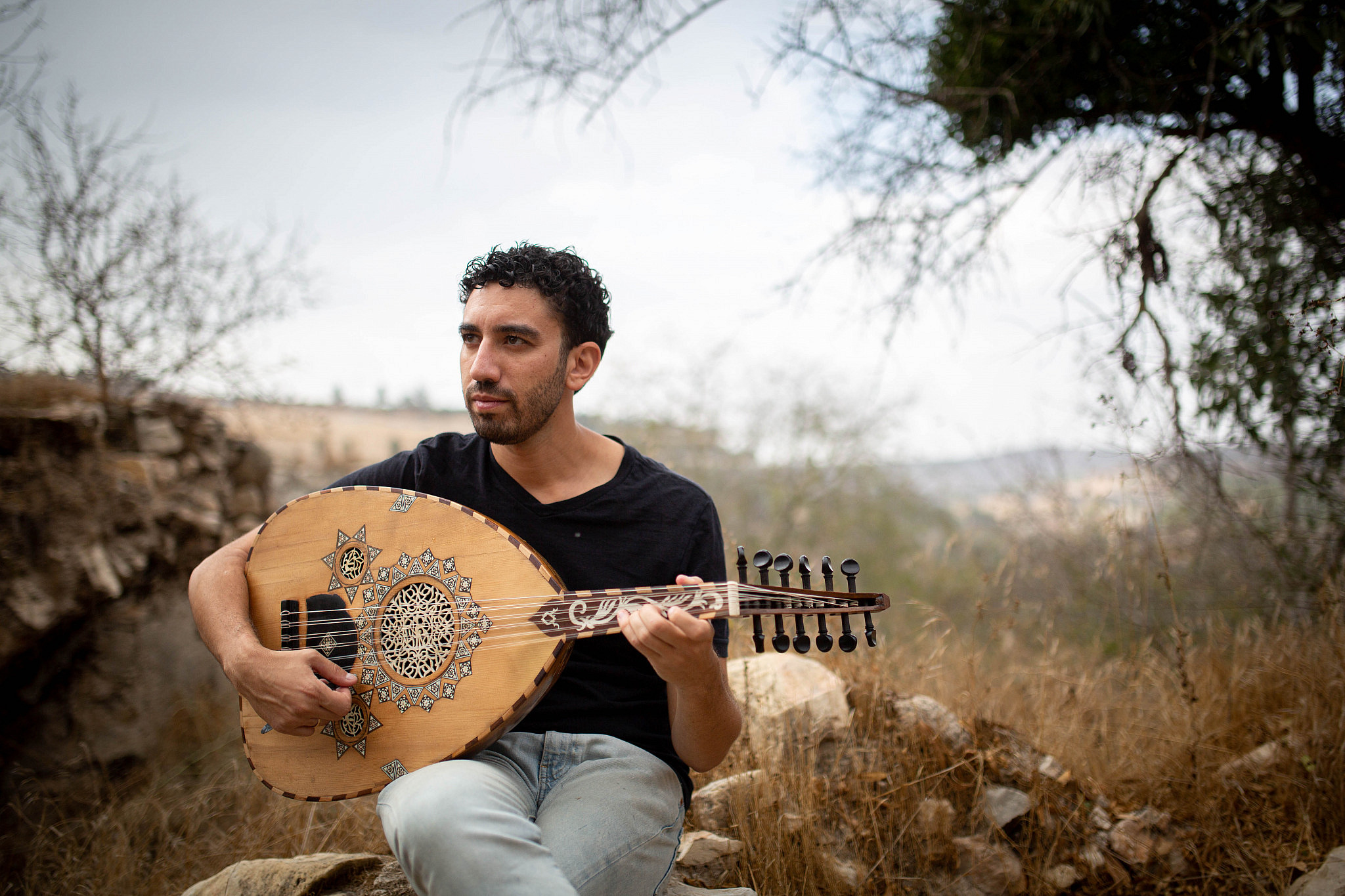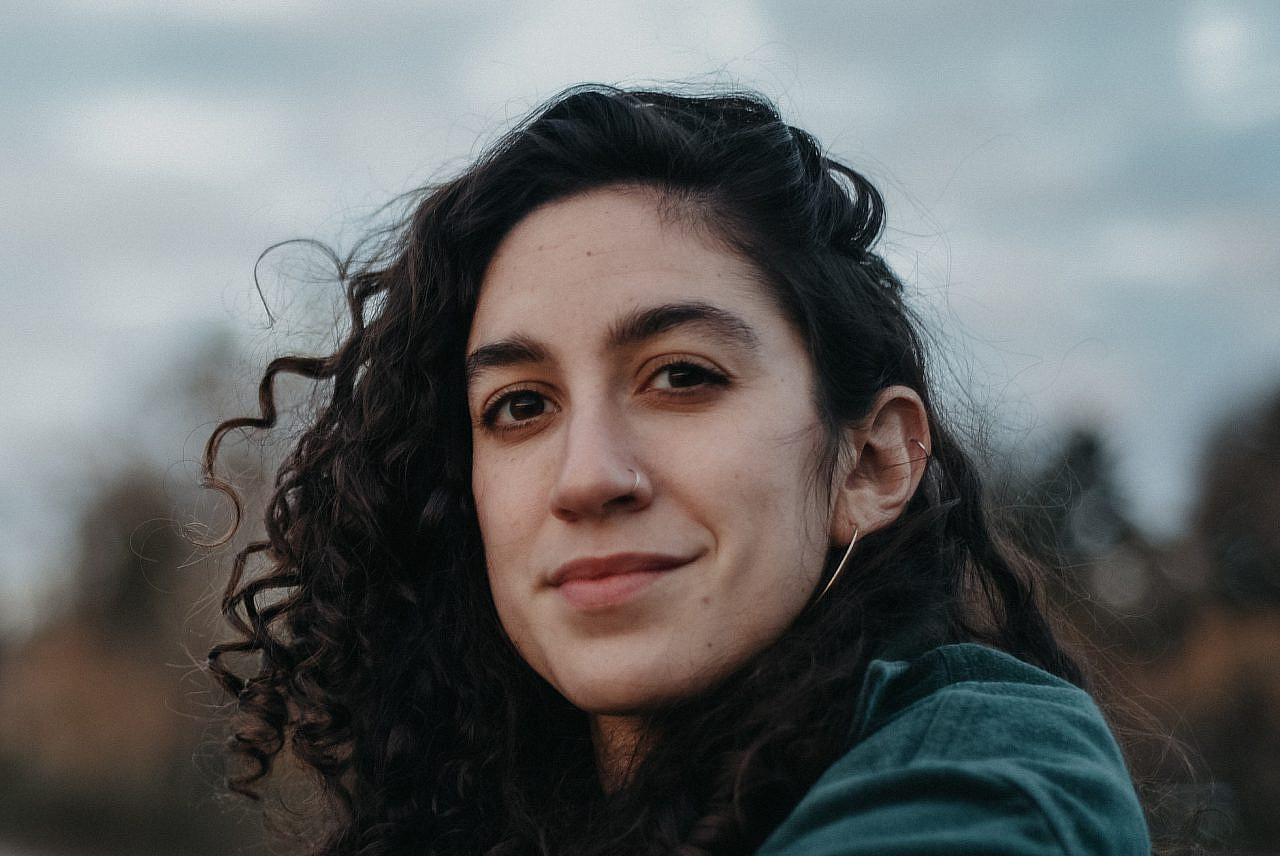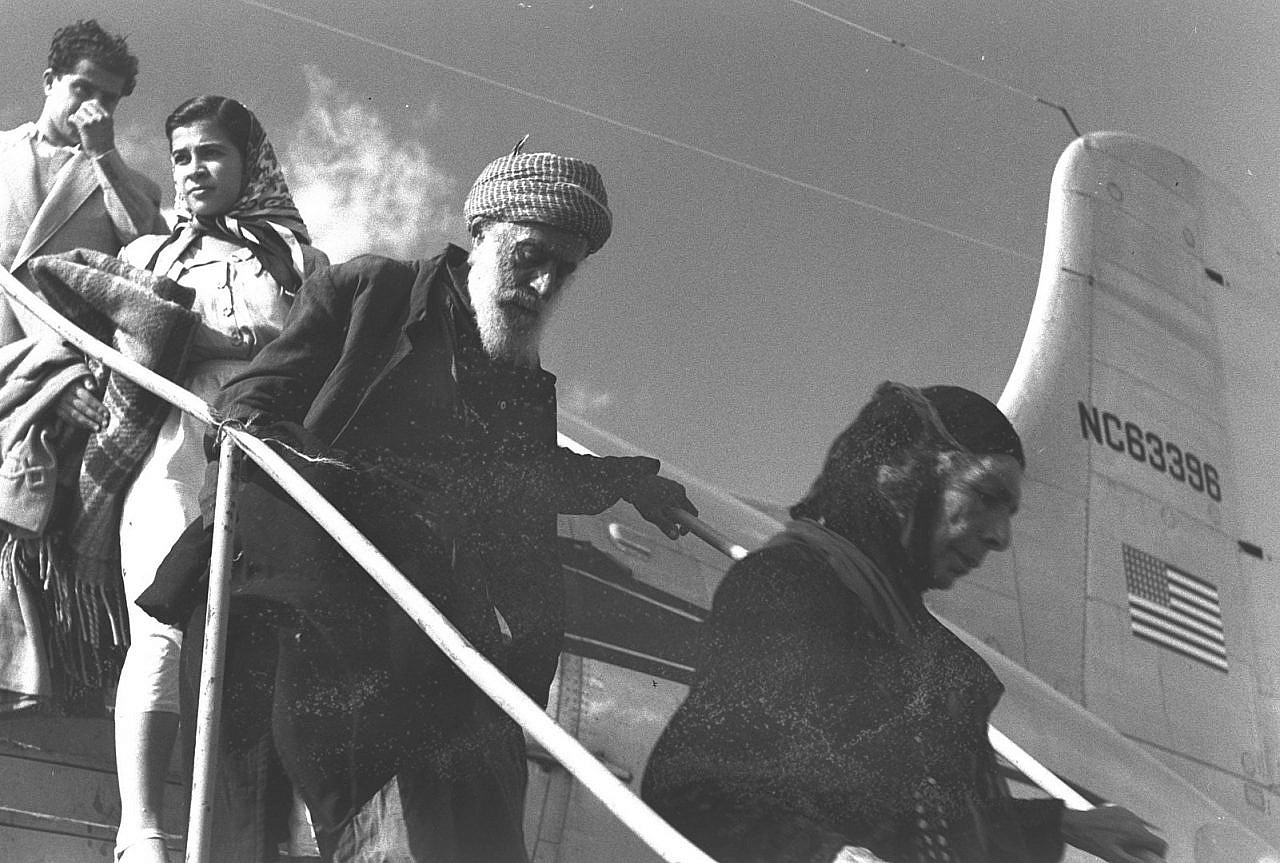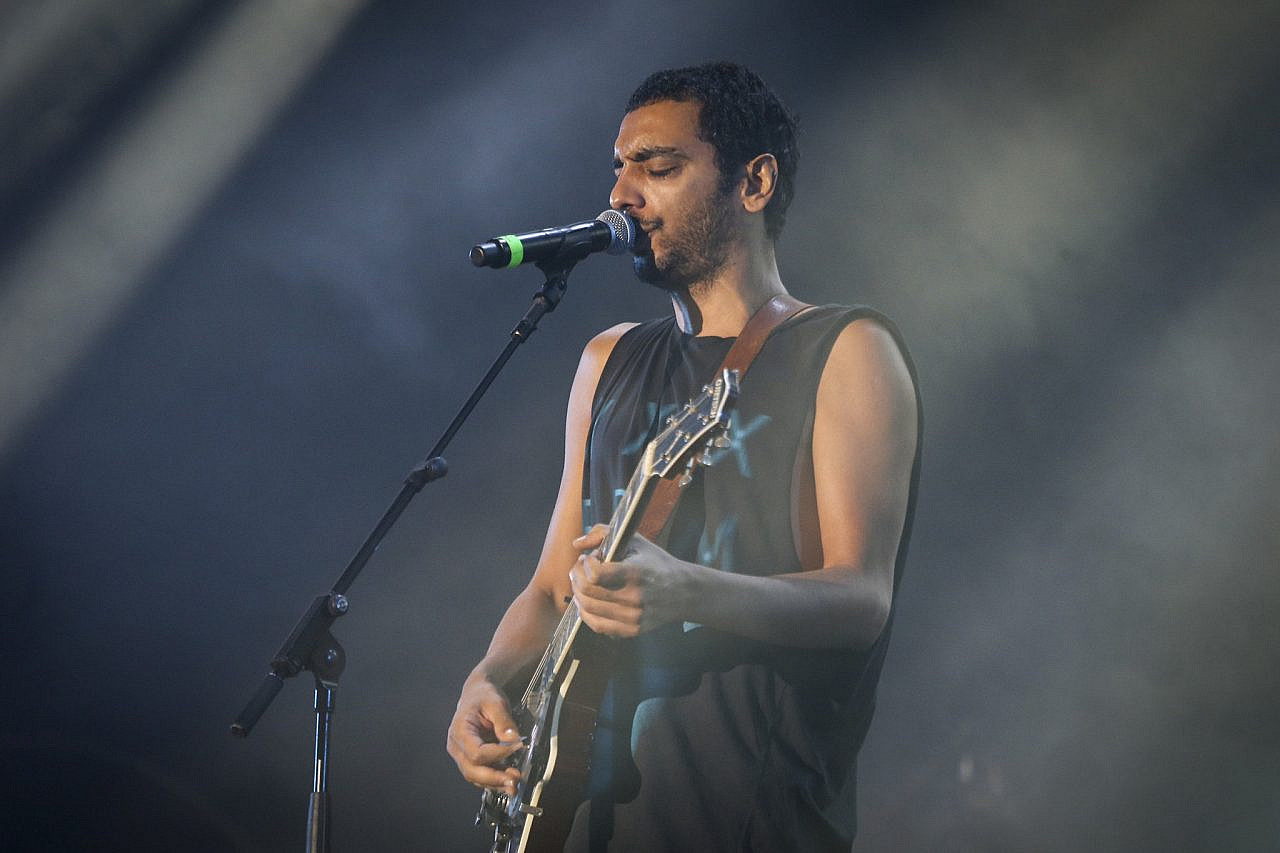Fragments, a new album by Yoni Battat, is a deeply personal exploration of fragmented memory, lost languages, and distant ancestry. It is his first release in the style of Arabic maqam, which utilizes notes that fall between the notes of Western music, known as microtonality. A multi-instrumentalist, vocalist, and composer specializing in contemporary and traditional Jewish music from Eastern Europe and the Middle East, Yoni maintains an active performance schedule across the country, playing violin, viola, and oud (Middle Eastern lute) in collaborative and interdisciplinary projects spanning a wide range of styles.
Released in September, Fragments was created in the context of the Community Creative Fellowship, and with the help of countless collaborators including Yoni’s sister, Sivan. A theatre director, organizer, and story-teller, Sivan is also the Associate Artistic Director of Noor Theatre, a New York-based theatre company dedicated to supporting, developing, and producing the work of theatre artists of Middle Eastern descent. While both siblings are each reclaiming their Iraqi-Jewish identity through different mediums, Fragments marks the first time the two have collaborated as artists since the homegrown, family productions of their childhood.
In this exclusive conversation for +972 Magazine, Sivan and Yoni discuss the album, their collaboration, and their shared and diverging experiences of a mixed Mizrahi-Ashkenazi-American identity. The conversation has been edited for length and clarity.
Sivan: Why don’t you start by telling me about the inception of this project. How was it born? Where did it come from within you?
Yoni: I knew I wanted to release an album in the style of Arabic maqam — a tradition I have been immersing myself in for the last 10 years. I had so many musical ideas, but every time I started writing, I would start feeling imposter syndrome [over] my right to represent this very rich and beautiful culture, which I revere, to broader audiences — especially ones that are not familiar with it. And the more I felt that tension, the more it was holding me back from being able to do anything. But in the Fall of 2021, I was accepted into the Community Creative Fellowship in Boston, which allowed me the structure and funding to be able to organize my creative work within a timeline, and that really helped me get my act together.
Even so, it took some serious grappling to figure out how to allow myself to represent my culture while I still feel that I have so much to learn. And ultimately, what set me free ended up becoming the message and theme of the album itself: taking that messiness and making it a part of the story. I began to uncover the fragmentation of my identity: how I can no longer ask my grandparents about their life in Baghdad or their departure from Iraq; how I can’t visit the land where my ancestors lived for thousands of years; how I didn’t grow up with Iraqi-Jewish culture outside my home or with the Iraqi-Jewish melodies of generations past.
This wasn’t necessarily new to me. I obviously noticed the fact that I was a half-Iraqi, half-Polish American Jew growing up in an Ashkenazi community in suburban Connecticut. But I hadn’t realized how much my fragmented identity was keeping me from expressing myself — how much it was shaping my experience as a human in the world and especially as a Jew.
Once I was able to harness that roadblock as a part of the story, it really opened up some important pathways for me. I felt like I had permission to say, “I may not have grown up immersed in this culture. I may now be learning Arabic as an adult, in what feels like a very academic way, many times removed from the source of my ancestral language. But despite all that, what I have to say is worth hearing.”
Sivan: Let’s talk a little bit more about that experience, growing up as Iraqi Jews in the United States. You said Arabic maqam is this tradition that you’ve been immersing yourself in over the last few years, but also something that was quite hard to access through the Ashkenazi-dominated musical spaces that informed our Judaism as young people. Can you explain how your upbringing has shaped your musical journey to this point?
Yoni: Well, you and I grew up close in age in the same family. I know that our stories have a lot in common and also a lot of differences. I’ve been answering this question very often lately, so I’m actually curious to hear what you have to say!
Sivan: Okay, so you and I and our youngest sibling, Nadav, grew up just outside of New Haven, Connecticut, to an Ashkenazi American-Jewish mother and an Iraqi-Jewish father who was born in Jerusalem, and whose parents — our grandparents, Abraham and Violet — were born in Baghdad. We grew up really close to family members from our Iraqi side. So I think having our Iraqi grandfather in the home with us was a huge part of our experience of Iraqiness in our youth.
Within the American-Jewish schooling system and broader community, I understood my father’s particularities and the things that set him apart from all the other third graders’ fathers as what I called “Israeli.” I didn’t understand that he spoke Arabic to my grandfather not because of his Israeliness, but because of his Iraqiness. Because of the systems we were raised in, I wasn’t given language to understand my ancestry as it predated the establishment of the State of Israel in any significant way.
So I understood myself as a “Sephardi” Jew, and that’s what made me different — that’s why my grandfather would pick me up from elementary school in an all-white suit, shouting at me in Arabic across the parking lot. The two frameworks of Jewish history that were available to us were Eastern European history and Israel, so it took a long time for me to realize that there were other parts to my lineage. It was always very confusing to go to school and learn about “Arabs versus Jews,” as we were often taught within Zionist schooling systems, and then come home and have my grandfather speaking Arabic, listening to Umm Kulthum, and really connected to his Baghdadi identity.
Yoni: That’s really well put, and helps me to contextualize this in a different way. I also wanted to add that our “Israeliness” was something that our community had language around and appreciated about our family. We knew we were different, but we thought it was because we speak Hebrew and make “Israeli food.” Within the psyche of the community, our Israeliness was exotic yet easy to appreciate and welcome. They didn’t really know what to do with our Iraqiness.
Sivan: Right. But despite that, the Iraqi culture in our home was strong. Our Ashkenazi grandparents on our mother’s side lived in Florida, much further from us, so we [were less immersed in] their experiences.
Yoni: And immigration to America was further back in the story of that side of our family. Our mom’s parents didn’t speak Yiddish. I don’t think Yiddish was a first language even for our great grandparents. I would categorize them more as American Jews than anything else. The reason I feel more Iraqi is for the reasons you gave, but also because I personally knew my grandparents who were born in Baghdad. I didn’t personally know my ancestors that were born in Poland, or Russia.
Sivan: On top of all of that, our grandmother, Violet, was very committed to Arabic as a language. I think her “Arabness” is a more complicated conversation because of the politics of identity, migration, and Zionism. But Arabic was sacred to her, second only to her children and grandchildren. She was an Arabic linguist. She spoke many dialects and was able to communicate with anyone from the Arab world.
As the first granddaughter after about 15 boys, she really insisted on teaching me; [I think she thought,] “if no one else will, at least my granddaughter will speak it.” She had a radio show that was broadcast from Jerusalem across the Arab world. There are so many stories I could tell about her but I think her influence was strong in the household for my father, [who wanted] to keep this culture alive. We ate sabich every Saturday for Shabbat breakfast, we ate kubbeh, and we ate malfouf and ba’ba’ b’tamar on Rosh Hashanah. We were exposed to Arabic music.
This was always presented to us, though, as our “Israeliness.” Always. I think it took until I started anti-occupation organizing and working with Jewish justice communities for me to find language around the specificity of my Jewish identity. And I think you and I, Yoni, have gone hand in hand on that excavational journey. We’ve studied Arabic together and had such nourishing deep conversations about our identity.
Yoni: And in the context of my album, while we had a lot of strong Iraqi food and language at home, I didn’t feel like I knew a lot of Iraqi music, and I didn’t feel like I had a lot of Jewish religious content around my Iraqi identity. I remember my grandfather saying some extra Iraqi prayers from the Rosh Hashanah seder which used wordplay and puns on the fruits and vegetables on the table. I remember him doing kaparot for us with crisp dollar bills. But I didn’t experience much Jewish prayer with Iraqi melodies. I heard some slichot music, and a lot of Israeli Mizrahi pop.
As a young musician, having started playing the violin at age four, the musical aspect was and still is really important to me. And even outside of Jewish content, I didn’t know much old Arabic music. While my grandparents definitely listened to Umm Kulthum, for example, I didn’t really. When I was a kid, I didn’t really hear the sounds of classical Arabic. And that’s sort of what set up this need for me to discover it as an adult.
Sivan: I would say that’s true, except for the hook of [Umm Kulthum’s] Enta Omri, which our father sang all the time to himself.
Yoni: Right. Sort of. I think Enta Omri has entered into Israeli consciousness as an important and recognizable musical phrase. It’s been incorporated into Mizrahi pop music, and for that reason a lot of Israelis would recognize it. To me, that could be the reason our dad knows it — because he grew up as an Israeli who loved Mizrahi pop, more so than the fact that he’s Iraqi. He did share memories of hearing his parents listening to reel-to-reel recordings of Arab classical music at home as they entertained guests.
Sivan: This takes us to our grandfather, who came to the United States in the 1970s from Jerusalem. There’s a lot of lore around why he decided to move the whole family. Sometimes our dad says he hated having to introduce our grandmother with all her degrees because nobody took her seriously as an Iraqi [in Israel]. And sometimes it’s, “well there was more money in the United States.”
My grandmother stayed in Jerusalem to run her radio show, “Mujalat Al-Usra,” which means “the women’s magazine.” It was a program on Kol Yisrael B’Aravit [“Voice of Israel in Arabic,” a public radio station]. And my grandfather would write her letters as pseudo diary entries. He would write about who’s going where, who’s up to what. And he’d send them to my grandmother periodically — five or six pages of little snippets from the course of two weeks of his life and their children’s lives in the United States.
Two or three years ago, at some point during the pandemic, our father found a bunch of these letters that my grandfather wrote to my grandmother, and they’re written in a combination of Arabic, Hebrew, and English. I brought them to Haneen, an amazing Arabic teacher I study with who’s from Gaza and lives in Portugal with her children, and I said, “maybe we could spend some time translating the Arabic parts of these letters. I don’t know what’s in them and I’d really love to learn bits of Iraqi and understand more about my grandparents and their relationship.” For context, our grandfather passed away in 2011, and our grandmother many years before that.
Haneen looked at the first Arabic passage of the letters and said, “Woo, it’s a little spicy! This is a love letter.” So we began translating it, and it turned out to be my grandfather writing his longing for my grandmother in an effusive, romantic way. And he would put those parts of the letter in Arabic because that’s what his kids couldn’t read. I think it was also because the language in which they fell in love was Arabic and the language in which they expressed their love and lust for each other was Arabic. It was quite a start.
So after that, [you and I] started working with Haneen to translate these letters. We spent hours and hours just poring over the Arabic sentences with Haneen, and translating the Hebrew on our own. And that led to one of the songs on the album. Do you want to talk about that?
Yoni: Sure. I’ll just also add that the status of that project is still chaotic. At no point did we finish working [on the letters] and then say, “Okay, now we have a straightforward translation!” The way they’re written is such a stream of consciousness, combining logistical details of the day with light musings and deep thoughts. And it’s hard to make sense of them even if we understand every word.
Sivan: And the poetry of longing is hard to understand too!
Yoni: Plus, we’re looking in as outsiders, of course. The two of them are the only ones who can really understand.
So as we were translating the letters, I was always on the lookout to find little nuggets of beautiful phrases. I think in the back of my mind I always hoped I would set some of the words to music, which is not what I did here, but maybe one day.
Sivan: Rah n’shuf (Arabic: “Let’s see”).
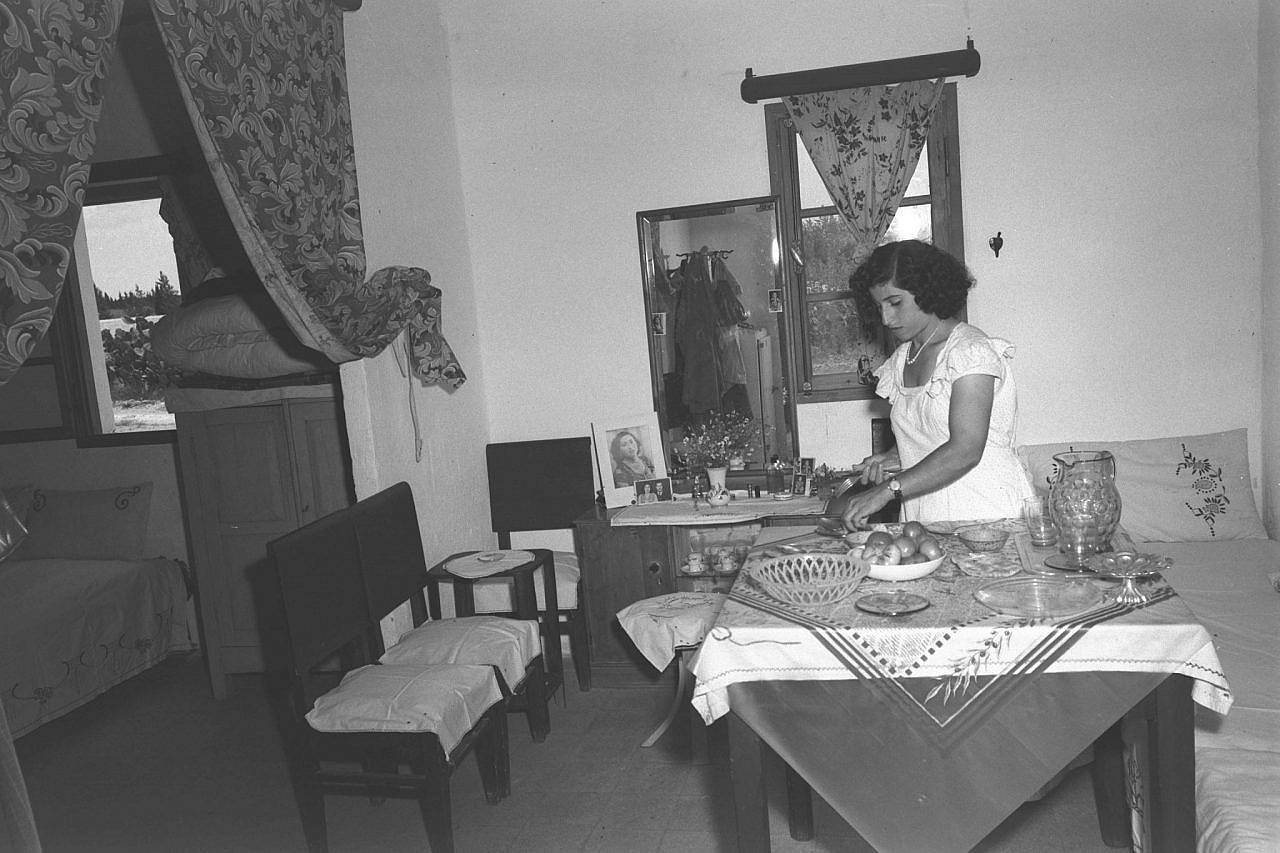
Yoni: But we came across a phrase that said “Ani akhshav ro’eh et Efrat rokhevet ‘al ophanayim, wasarat sheikhat al-hara,” which means, “I now see Efrat riding her bicycle [in Hebrew] and she has become the elder of the neighborhood [in Arabic].”
I think, Sivan, you and I both had the same experience when we heard this. We had an image of our little aunty Efrat. In my mind the words from the letter created a flooding sensation of memory, even though it wasn’t an actual memory I had, [and] it helped me realize that memory isn’t always about the specific facts and details. For me, it’s often more about trying to find some sort of an emotional, aesthetic, visceral, sensory connection. For those of us who don’t have a lot of details about our family’s experience, this can be just as healing and beautiful as actual facts and details.
So this song, “Sheikhat al-hara,” elder of the neighborhood, was inspired by that one line from the letters. I rendered the idea as an instrumental piece on the album, which aims to capture childhood playfulness, within the framework of traditional Arabic instruments and forms journeying through different maqam worlds.
Most importantly, that realization about accessing fragmented memory started me on the journey to discover what other connections are possible within that frame, which ended up becoming a central theme of the album.
Sivan: To shift out of our own family history a bit, maybe we can talk about fragmentation in the context of Mizrahi Jews in general. The idea of diaspora varies so much in different Jewish communities. For Mizrahim in Israel-Palestine, diaspora might mean one thing, and for Mizrahim in the United States it might mean something else. There’s an amazing essay by [Israeli scholars of Mizrahiyut] Sigal Nagar-Ron and Pnina Motzafi-Haller called “My Life? There’s Not Much to Tell,” which draws on a series of interviews with Mizrahi women about their lives and their journeys. The thesis was that a lot of these women’s stories came in fragments — with starts and stops and gaps and contradictions.
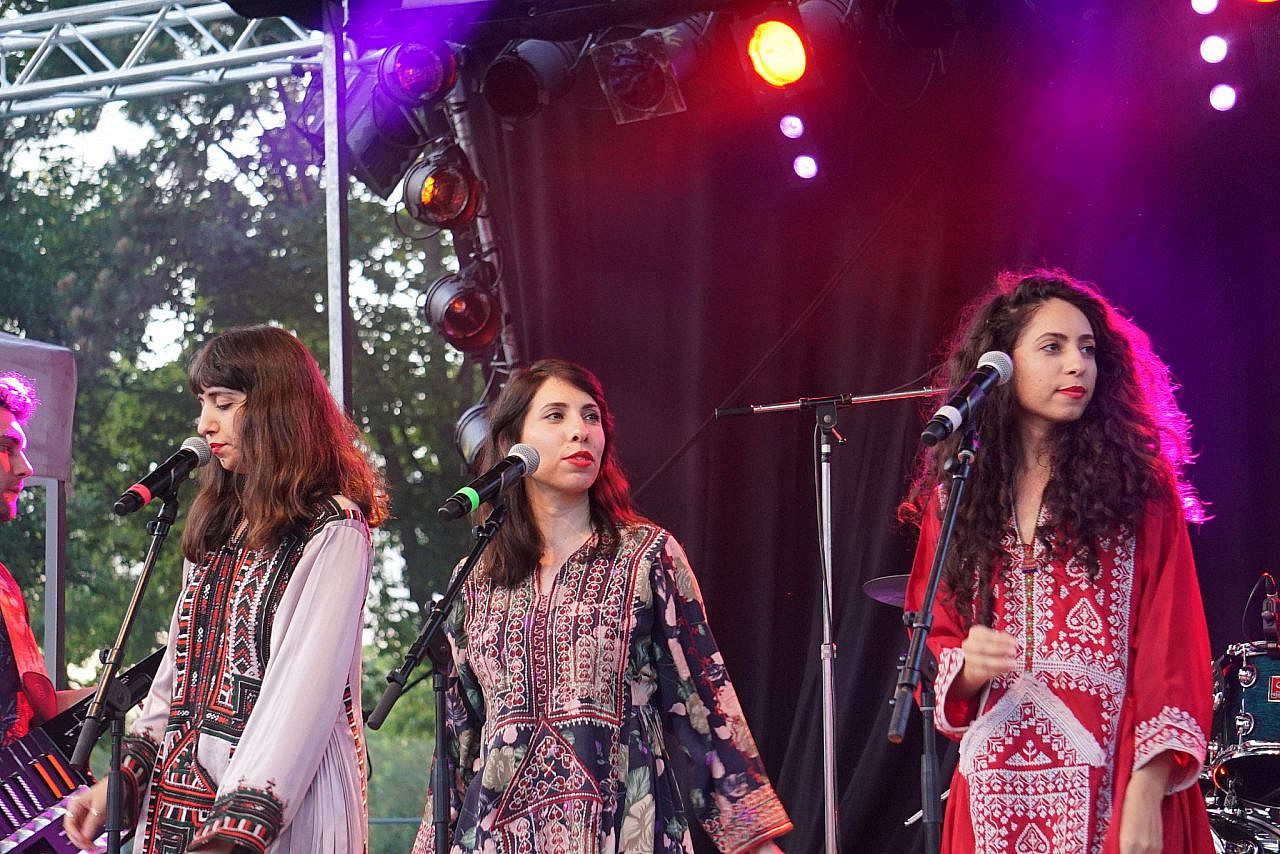
I think it’s really powerful that you, Yoni, similar to these scholars who have approached this from the academic side, are leaning into this topic from the artistic side. You’re in conversation, I think, with a lot of Mizrahi musicians, like Dudu Tassa and the Kuwaitis, and A-WA, who are making music in their ancestral languages as a way of being in conversation with the stories that come in fragments. And that’s part of the story of our erasure.
Yoni: Fragmentation is something that so many of us experience in the world. But Mizrahim have experienced fragmentation in a particular way. The withholding of memory, facts, and details is sometimes intentional — specifically in the complexity of our ancestors that came from Arab lands to Israel-Palestine. Many didn’t know how to make sense of leaving their homelands and wanted to protect future generations from the discomfort of that complexity — especially in such a fraught political landscape.
Sivan: I think fragmentation and erasure are shared by so many communities that have been harmed by colonialism in different ways. And specifically for Mizrahim there were financial, social, and cultural rewards for a selective memory of homeland. The extraordinary Dr. Yali Hashash, who is a scholar of feminism and justice among other things, taught me about the financial rewards for Jews from Arab lands who cited their experience of being harmed by the Holocaust and by Nazism. So there’s an aspect of choosing what to remember and what not to remember, and there’s social and financial capital available for Arab Jews who distance themselves from Arabs. Many of the same forces that have created chasms between Arabs and Jews have also caused the fragmentation we’re talking about here.
Do you want to talk a little bit about the political project of the work?
Yoni: I admire activists, like you, who are taking pointed action toward positive change in the world. I see myself more of an artist than an activist. I mean, my work is seeking to make change in the world, but via a different route. My artist-activism more gently seeks to expose American listeners, and American-Jewish listeners especially, to the beautiful sounds of Arabic music — music I am so enthusiastically in love with. Ultimately, I’m just trying to open minds to new aesthetics of beauty.
Of course, that has political implications. On the most basic level I’m trying to make a case for Arab-Jewish identity, to expand the possibilities of Jewish expression, and to create more appreciation for Arab culture as Jewish culture. On a political level, I think this has the potential to open people’s hearts, allowing us to see the beauty and humanity in one another, instead of the ugliness.
Sivan: How do you feel about spending so much time in Jerusalem this year? And what are some of the distinctions you understand about sharing this music in Israel-Palestine versus in the United States?
Yoni: It’s funny. This was not necessarily my intention, but the day the album was available to the world, I was so far away from my home community. Releasing the album while in Jerusalem caused people to ask when I’ll be doing a release concert here. I hadn’t even thought about it, because this music was not designed at all with Israeli audiences in mind. But now that I think about it, I realize there are so many parts of my story, and so much about these sounds, that is familiar, comfortable, easily understood by audiences here. Things that aren’t understood in the States.
So even though the message of the music will land very differently here, I’m excited to share it. I know there will be some resonance, especially around Arabic language, which is being reclaimed more by younger generations of Mizrahi Jews in Israel-Palestine. The music is everywhere here, so it’s not like I have a project of exposing this population to Arab music. That being said, there are some amazing musicians here that I love working with, so I can’t wait to play these tunes with them.
Correction, Nov. 18, 2022: A previous version of this article stated that the article “My Life? There’s Not Much to Tell was authored by Pnina Motzafi-Haller alone. In fact, the article was authored by both Sigal Nagar-Ron and Pnina Motzafi-Haller.

